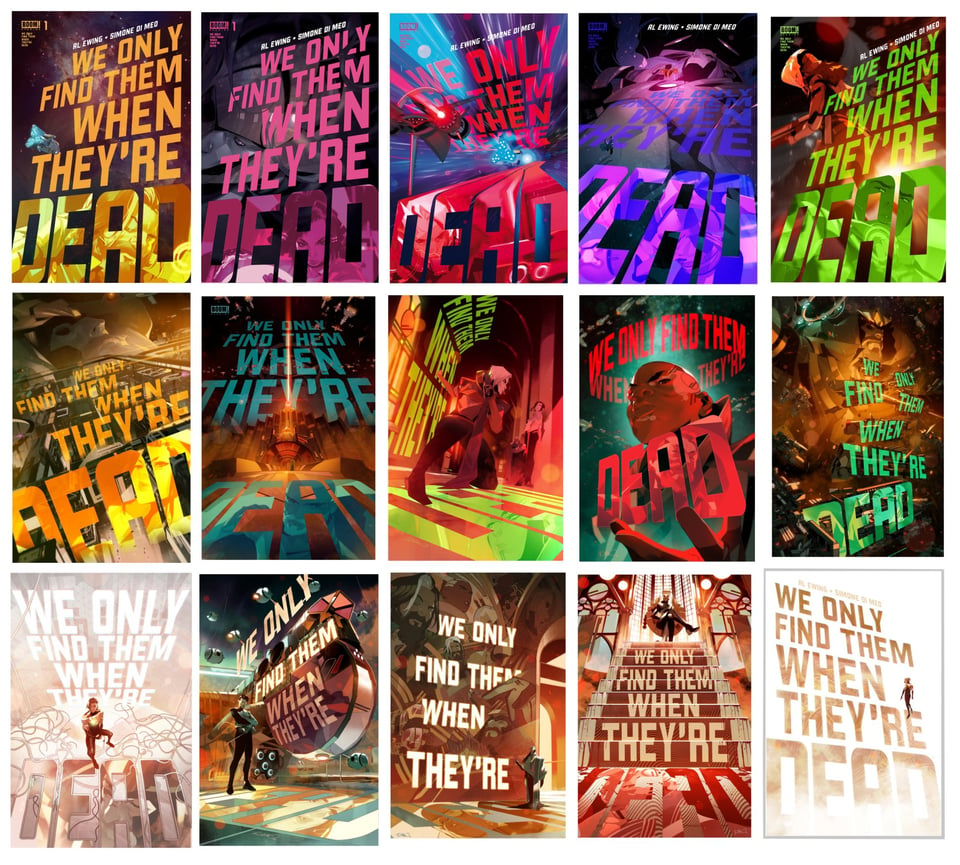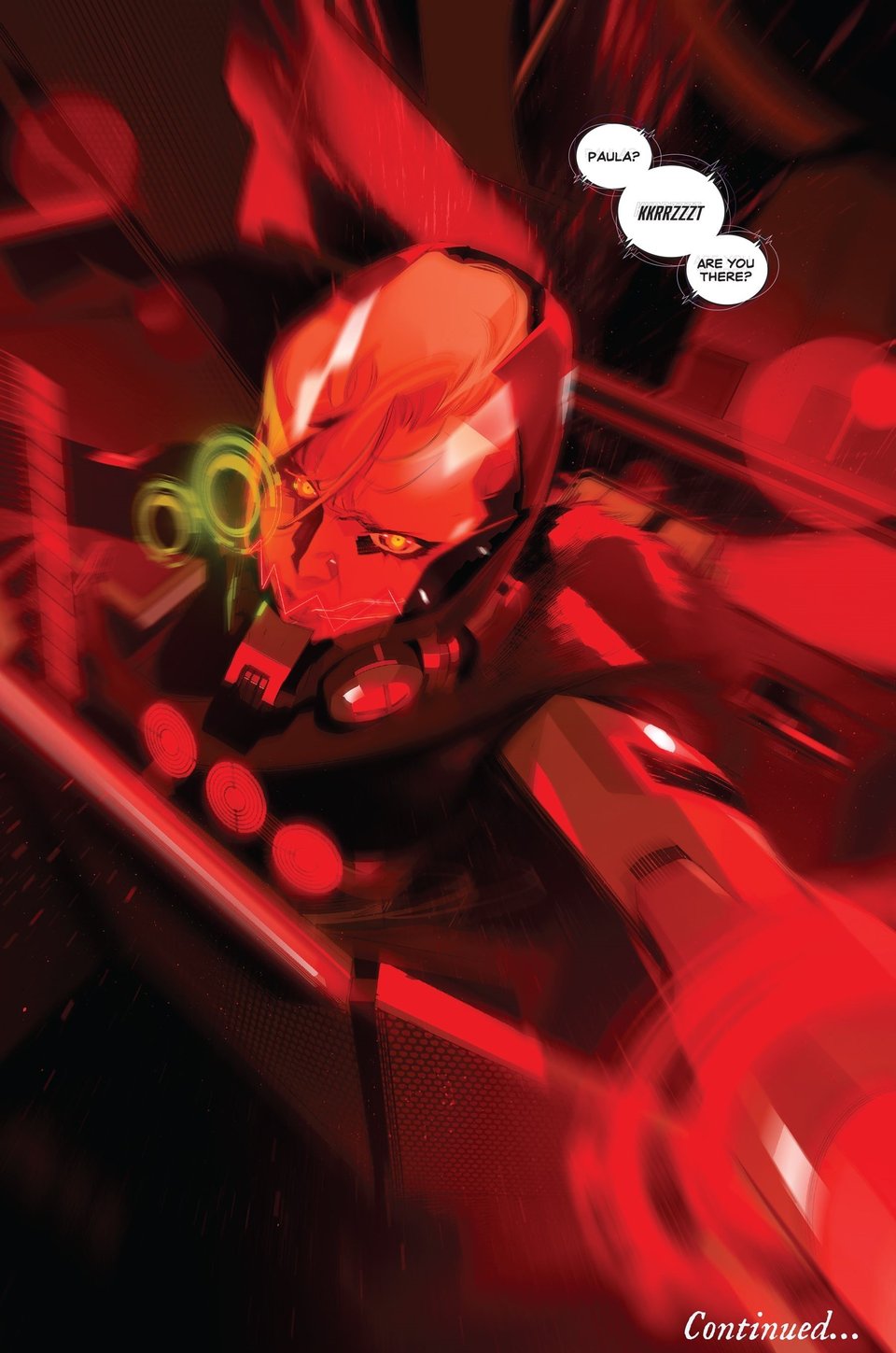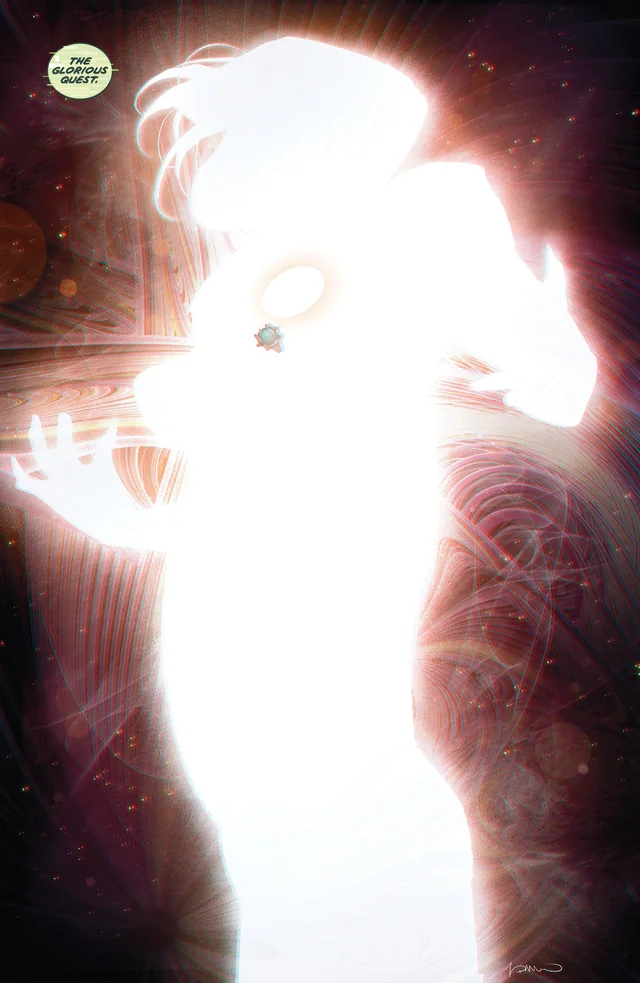Losing something on the way to us - an autopsy of We Only Find Them When They're Dead
Woof. Whowatch was a delight and a deeply worthwhile endeavor, but it's left me rusty as hell in working fully on my own; the Bleach piece took far longer than I would've expected, and I suppose I'm still shaking it off. Next one'll be quicker though given the subject matter and format.
Bugged me since last time: I forgot to include A Christmas Carol on my final list of favorite Who episodes! Went back and edited that in for posterity's sake.
There's not really anywhere in the piece below to organically note it, but issue #7, page 20 of today's subject has a pretty solid little contextually-sacrilegious double entendre I missed until the reread for this.
Plenty watched and read since last time, but that'll all be covered in the next newsletter!
Speaking anecdotally: there don’t seem to be that many Al Ewing fans.
This is admittedly by a pretty particular definition of ‘fan’; he’s one of the most universally beloved figures in the industry as it stands. Whether operating on the fringes with the likes of Contest of Champions or Royals, heading up reasonably notable shared-universe touchstones such as X-Men Red or Empyre, or focusing on oddball pet projects with You Are Deadpool or Defenders: Beyond, Ewing’s name has become a recognized seal of quality at Marvel in the last decade. At his worst with Venom you still get flashes of inspiration; more often you wind up with a fan-favorite in Ultimates or Loki: Agent of Asgard; at his best he pulled off an era-defining classic in The Immortal Hulk, a feat he’s laboring in the shadow of on The Immortal Thor with Martín Cóccolo. If not in the ‘architect’ position occupied by your Bendises or Hickmans, he’s won recognition and acclaim by sheer force of quality.
But for all that, I don’t often see the sort of discussion on him I see around his comparably talented peers. Maybe it’s a consequence of the chameleonic quality that lets him shift casually between the likes of Ant-Man’s buoyant celebratory tone and the back half of Valkyrie’s ruminations on death’s agonizing necessity, keeping him from forming a clear shared identity within fandom beyond ‘He does fun stuff that gets the characters right and he did Immortal Hulk. Also he likes to use Blue Marvel a lot.’ He’s treated as a pleasant occurrence for your favorites, not a figure to follow in his own right. I don’t see him getting the same kind of involved discussion as others of his pet thematic concerns, his craftsmanship, or his early work such as his 2000AD output (both the regular features and originals such as Zombo and The Zaucer of Zilk) and six novels.
And I didn’t see people talk about We Only Find Them When They’re Dead.

Launched 2020 at the height of Ewing’s popularity alongside Simone Di Meo, with color assists by Mariasara Miotti and letters by AndWorld Design, We Only Find Them When They’re Dead follows a future in which dead ‘Kirbyesque’ gods float inwards from the edges of the galaxy, whereupon they’re harvested for their alloys, technologies, and raw godmeat to fuel an expanding human dominion. Unfurling the centuries of consequences of Captain Georges Malik and his ‘Autopsy Ship’ crew setting out past the galactic border in hopes of discovering a live one, the story is broken up into three books with their own genre concerns (pathos-ridden Hollywood blockbuster, brutal espionage thriller, and melancholic, existential ‘what’s it really all about, man?’ sci-fi, respectively).
As a concept it seems like the perfect triangulation of hooks to pull in Ewing’s Marvel fanbase, Hulk’s eschatological body horror foregrounded via the kind of ‘cosmic’ concerns of so many of his titles. In theory, it’s the same kind of sensible lateral move as the types made by Hickman and Tynion to carry over an enduring audience fostered at the big two into a solidly successful creator owned/shared title, springboarding into further material in that area.
In practice: he sure has done a bunch of Marvel books since this.

I don’t wanna give the sense that this was some kind of groaning, obvious failure. The book is loaded with the customary pleasures of Ewing’s writing - his logistical acumen and clarity, bolstered by the ability to structure an entire universe’s mechanics around clever setups and reveals rather than having to pull from and contextualize decades of continuity detritus, as well as his talent for the poetic turn of phrase and economical characterization. Di Meo conveys the encompassing claustrophobia of a collective human space only barely shielded from the infinite vacuum across wildly varying scales, with motion blurs and judiciously applied wide lens closeups (occasionally bordering on fisheye) getting across the speed of the various craft in play. And his and Miotti’s colors define the book’s aesthetic; shafts and slices of neon against the endless void, endless flavors of sterile monochrome broken up by the jellied blood reds of memory and meat. Even if there’s something to be said that the style simply isn’t schlock grody enough for conveying a world built around blasphemous vivisection, at the end of the day it remains nothing short of scrumptious.
Trying to find the ‘problem’, the commercial issue is fairly obvious: by Ewing’s own admission “the ‘autopsy ships’ that were the original selling point ended up taking a backseat to an ever-growing world of changing politics, driven by obsessive quests for knowledge,” and bereft of the concepts’ extremes in both cosmic revelations and indulgent grotesquerie the most obvious parallels to his big two work vanished pretty much immediately. It rapidly became a book exclusively for diehards like me, and as I mentioned before, there don’t seem to be many of those. Not that there aren’t significant recurring themes throughout his work by any means - We Only Find Them When They’re Dead wants to tackle any number of ideas that have followed Ewing throughout his career. The line between humanity and divinity; the ability of identity to grow and change itself in spite of forces straining to revert us to our baselines; a preoccupation with the nature of power and how to attempt to wield it properly, shot through with a streak of confrontational righteousness that as in many of his texts culminates in a torture sequence emphasizing its uselessness for any purpose but simple cruelty, the capstone to the myriad ways and reasons for people hurting one another singularly and en masse throughout the text. One of the most significant recurring models of heroism in Ewing’s work is the ‘doctor hero’, from America Chavez as ‘paramedic to the multiverse’ to Valkyrie, the titular Doctor Who to Doc Thunder of Gods of Manhattan, Blue Marvel to Doc Samson to Fazzia Hussain, the champion who by their nature works to heal rather than harm; in this context, the protagonists being those who pull bodies apart after it’s already too late is a strikingly deliberate choice for establishing the depravity of the setting.
But all of this is, in fact, a significant issue unto itself. Framed through a lens of Hickman-esque stateliness - particularly employing one of Hickman’s pet techniques of bolstering a phrase’s power through repetition - there’s a resulting degree of emotional remove. While Georges Malik and his ship engineer Jason Hauer have clearly defined emotional narratives,* this means most others, particularly in the deceit-ladden second book, are caught up in layers of exposition and machination that head off much in the way of sympathetic engagement. This isn’t necessarily guaranteed to be an impediment: while Ewing’s best character work tends to be with more emotionally upfront figures, and with a sense of humor by his own admission rooted in the outlandish, cartoonish verbosity of Stan Lee, he’s shown plenty of facility with taciturn, level-headed, and deeply ambiguous figures. But with the task of fleshing them out jostling for space within 15 issues against the expression of virtually every one of Ewing’s pet themes, trying to wrangle together the most definitive, all-encompassing summation of his concerns as a writer into a single coherent thesis? It’s just too much, too mechanically inclined to try and check all those boxes despite frequent moments of grace, and the whole thing withers on the vine as a result.
(* Their definition relative to their crewmates highlights something I’ve been mulling on worth noting: while Ewing’s franchise work frequently centers, enriches, and complicates women, left to his own devices here and in his novel work, they often find themselves delegated to either ill-defined roles, or ones with their autonomy textually undermined such as to limit their modes of expression. This isn’t at all to suggest some hidden misogyny on Ewing’s part, just that as a creator who has expressed a desire to investigate his own unconscious biases and inclinations and continuously improve, it may be worth his while to mull it over.)
Honestly, it’s in that regard that this book fascinates me as a fan of his. His works rarely allow themselves to ‘fail’, their watertight structures and sheer elegance making them functionally perfect executions of intent whether or not what he’s doing is to your taste. This and his last novel The Fictional Man are the only ones in my opinion that reach conspicuously farther than he could grasp; for that alone they command my attention for what they reveal. And certainly I hope to see him keep stretching his abilities, which brings me to the central theme We Only Find Them When They’re Dead seems to be getting at as I read it.

There are a number of ways the nature of the ‘gods’ can be read in here, given the final reveal that they’re explorers like Malik transformed and come back to us, dying along the way and left open to interpretation - prophets, myths, religions themselves, all falling out of the hands of their tellers. Given the direct commercial exploitation however - and that framing as something distinct from those who venerate these figures - along with a few key statements and Ewing’s recurring interest in ‘the power of narrative’ in the likes of Loki and Ultimates, I suspect the intent here is for the gods to be storytellers. Everyone throughout is seeking to gain some kind of meaning and import throughout, to discover a form of existence embodied in the gods beyond the suffering of life as we know it (“What is alive?” “Alive is not screaming.”), even as the nature of them is to decay when approaching our galaxy, whatever they come to mean to us divorced from the intent of the original mortal souls behind them, no matter the necessity of that surrender. But that divine power is sundered by capitalistic forces stripmining these dreamlike figures, annihilating everything as they want more there is to take, and invariably the root cause of the “screaming” mortals would hurl themselves into the void to escape; their only competition are religious figures in turn trying to codify what the gods have to offer on their own terms, and ultimately seek their own capital and dominance. (Critics? Editorial? Fandom? Publishing houses? Or is that aspect of the narrative not particularly conducive to this layer of the metaphors in play?) Late in the book there’s even an AI writing metaphor a bit ahead of schedule (ChatGPT launched almost to the day a month before the final issue) as an attempt to rotely replicate the mind of a god fails until accepting it takes a truly living, thinking being to come to those kinds of epiphanies.
The nature of how to arrive at those epiphanies is what truly divides the three books, as I see it: the first is a group of people curious as to the nature of these ideas that “permeate the world” and hope simply coming face-to-face with it will be enough to enlighten them and free them of their torments. The second sees the veneration of the gods go hand-in-hand with their stripmining as those with money and power want to ‘crack the code’ of how they work and cut out the middleman, making it efficient, mass producible or better yet limited to a select few. The last shows an attempt at success by duplicating the work that’s gone before fail; only through introspection and individuation is our final lead able to not only achieve godhood, but to carve a new path of a living god. And critically, such a being can arrive only after the fall of “the xenotheological era” and “the old trading routes” - the collapse of the old order that would degrade the gifts “the idea” has to offer into the base mundane, allowing those who would take a step forward into the unknown to give back to the world without being diminished by that world. In other words: so long as capitalism remains to mine it out, no matter what power and beauty an idea may offer and what good may come of it, no matter the intent of the teller, the result will be compromised by a world ready to take a bite out of it. Something will be lost on the way to us.
At the time of writing after this so far singular creator-shared effort, Al Ewing’s only projects are The Immortal Thor, sporadic issues of Venom, and the miniseries Resurrection of Magneto, all for Marvel Comics.